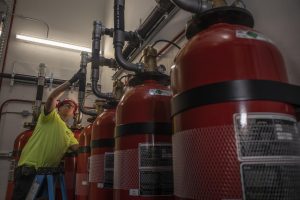What is a Clean Agent?
A clean agent is a fire extinguishing agent that is electrically non-conductive, volatile, or gaseous, and does not leave any residue behind. A clean agent fire suppression system consists of an inert gas or chemical agent that is stored in a container as a gas or liquid and discharged as a gas after the detection of a fire and can typically extinguish a fire when it is in its incipient stage.
Common Types of Clean Agent Systems
Some common types of clean agent fire suppression systems include:
- Inert Gases: nitrogen, argon, carbon dioxide
- 3M™ Novec™ 1230
- FM-200
Benefits of Clean Agent Fire Suppression
Why should you choose a clean agent fire suppression system? There are many advantages that clean agents offer including:
- No cleanup: clean agents leave behind no residue when they are discharged which means you won’t have a mess to cleanup.
- Safe: Clean agents are safe to use in occupied spaces.
- No Damage to Sensitive Assets: Water and other suppression agents can cause damage to sensitive assets like technology and electronics. Since clean agents are gaseous upon discharge, they cause no harm to assets.
- Fast Acting: Clean agents discharge within seconds, limiting fire damage to a small area.
- Minimal Downtime: Since clean agents are fast acting, leave behind no residue and don’t damage sensitive assets, your business will see minimal downtime when a fire occurs.
- Environmentally Friendly: Most clean agents are safe for the environment with zero ozone depleting potential.
Is A Clean Agent System Right for Me?
If you have a facility with sensitive assets such as server rooms, telecommunications, CNC machines, records storage, artwork or medical equipment, a clean agent system may be a good choice for you. If you are interested in a clean agent system, find a fire protection contractor who can answer your questions about clean agents.
